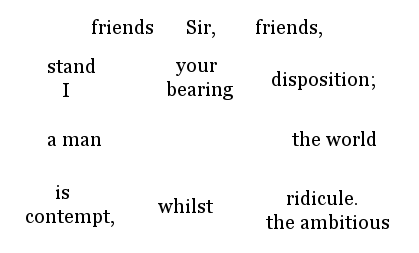
The Longaberger Company of Newark, Ohio, makes, um, baskets.
Founder Dave Longaberger wanted all the company’s buildings to be basket-shaped, but his daughters vetoed this after his death. Spoilsports.

The Longaberger Company of Newark, Ohio, makes, um, baskets.
Founder Dave Longaberger wanted all the company’s buildings to be basket-shaped, but his daughters vetoed this after his death. Spoilsports.
murcous
adj. lacking a thumb
In 1933, a lifeboat was found drifting in Barkley Sound on Vancouver Island.
It was marked Valencia — the name of a passenger liner that had run aground there 27 years earlier.
It was still in good condition.

“Sir, between friends, I understand your overbearing disposition; a man even with the world is above contempt, whilst the ambitious are beneath ridicule.”
From Dick & Fitzgerald, The Book of 500 Curious Puzzles, 1859.
“Tecumseh’s curse” refers to an odd coincidence in U.S. history: Every 20 years, we elect a president who dies in office:
The curse was supposedly invoked by a Native American chief’s mother as he died. Ronald Reagan and George W. Bush, for some reason, seem to have escaped.

In June 1625, Frederick V of Bohemia, having heard tales of a “9-year-old being miraculously tall,” summoned young Trijntje Keever to the Hague. The tales, he found, were true — Trijntje was already 6 foot 6, and she would reach 8 foot 4 before dying of cancer at age 17.
She was probably the tallest woman who ever lived — judging from an anonymous portrait in her hometown of Edam, her shoes were 16 inches long.
In his Remains Concerning Britain (1870), William Camden relates how a “scholar and a gentleman, living in a rude country town, where he had no respect, wrote this with a coal in the Town Hall:–Subi dura à rudibus.”
It means “endure rough treatment from uncultured brutes” — and it reads the same forward and backward.
Say what you will about the French, they know how to build an elephant:

This one, proposed for the Champs-Élysées in 1758, had air conditioning, a spiral staircase, and a drainage system in the trunk.
The French government said no. There’s no accounting for taste.
Write down any number:
886328712442992
Count up the number of even and odd digits, and the total number of digits:
10 5 15
String those together to make a new number, and perform the same operation on that:
10515
1 4 5
And keep iterating:
145
1 2 3
You’ll always arrive at 123.
What was the wonderful work of Mark Scalliot? Probably the smallest lock and key ever made. He was a London blacksmith, and this piece of mechanism (1578) was of iron, steel, and brass, all of which, with a pipe-key to it, weighed but one grain of gold. He also made a chain of gold, consisting of forty-three links, and having fastened the chain to the lock and key, he put the chain around the neck of a flea. The flea could hop around with ease in spite of the weight. The lock, key, chain and animal, all in a lump, weighed only one grain and a half.
— Albert Plympton Southwick, Handy Helps, No. 1, 1886